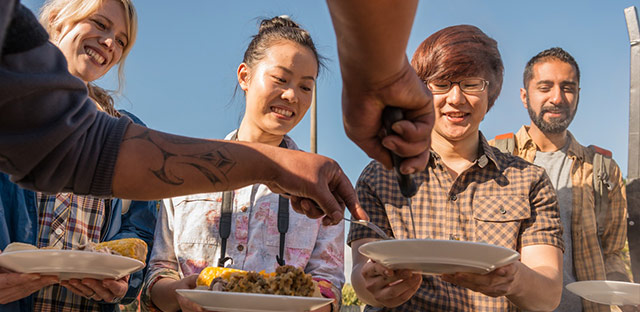New Zealand is home to about four and a half million people, with a new person arriving about every half hour (by birth or immigration). So, who are we, really?
Kiwi Society
New Zealand is home to about four and a half million people, with a new person arriving about every half hour (by birth or immigration). So, who are we, really?
Kia ora!
These two little Maori words say a lot about us. The phrase is most commonly meant for “hello”, but the nuance is more like “G’day!”. People also use it to mean good luck, well done, best wishes, and “Hear! Hear!”. It’s a phrase you can raise a glass to, like “cheers!” And while it’s got a lot of meanings, its nuance is always the same. Walk into almost any room, sing out “kia ora”, and everyone will know that everything’s ok.
Pronunciation tip: kya-oar-ra. Yes, it’s a mouthful of diphthongs. Don’t force it. It should all sound like one word. Roll the “r”, almost as if to rhyme with “fodder”. These local experts show how it’s done, with smiling ease.
Urban Kiwis
Most New Zealanders live in towns and cities, with 1.3 million living in greater Auckland. The other big cities are Wellington (204,000), Hamilton (150,000) and Christchurch (360,000). The majority of new arrivals in New Zealand live in Auckland. However, the construction surge following the Christchurch earthquake is reducing this trend.
Urbanisation is growing in New Zealand, and we seem to be getting good at it. In the Mercer HR Consultants’ annual survey, migrants currently rate Auckland as the 3rd best city in the world, and Wellington as number 12. The Economist rates Auckland as number 9 in the world and Monocle magazine puts Auckland at number 17, just behind Paris.
We’re also changing the way we urbanise. Most New Zealand cities consist of suburbs with houses and gardens, surrounding high-rise city centres. But as the population grows, cities are increasing their population densities, not just in the city centres, but also in the suburbs. This creates more diverse types of property and is generating better investments in things like public transport, data, and utilities.
Working in New Zealand
New Zealand enjoys a strong labour market. With unemployment currently at 5.9%, we’re about 9th best in the OECD (depending how you measure it, which varies between countries), and well below the OECD average of 8.2%. The average kiwi earns about $30 an hour, and about a thousand dollars a week. Current wage inflation is currently about 2% per annum.
Auckland – being the biggest city – also has the most jobs, and in 2015 enjoys the strongest employment growth. However, it may also have the most competition, with slightly higher unemployment (6.3%) than the national average. Canterbury enjoys the lowest unemployment at 3.3%, and the largely rural South Island is generally in higher employment than the North Island.
For more details about the character and lifestyle of the various different regions, check out our breakdown of New Zealand’s various cities, town and provinces.
Age is on the up
As in many countries, New Zealanders aren’t so keen on having babies as they used to be, so the population is slowly getting older. The experts have different ideas about what this means in the long term, but it’s likely that we will work longer, retire slower, and occupy smaller households. Plus: younger workers may enjoy higher demand as they become less prevalent over time.
Growing ethnic diversity
New Zealand is becoming increasingly ethnically diverse, and most people think this is all for the best. Europeans (including their descendants) are by far the most predominant, at 80% of the population, and the strongest group among these is English. The other main ethnic groups are
- Maori: 15%
- Asian: 9%
- Pacific Island: 7%
New Zealand education
Education is also something New Zealanders are really good at. Out of 62 countries (including most of the brainy ones), New Zealand kids rank number 5 for literacy, ahead of such cerebral heavyweights as Japan, Norway and France. New Zealand kids are also the 5thbest in the world at science, beating out number-crunching giants like Germany, Switzerland and the US.
Almost half of New Zealanders attain a university degree (ahead of Australia, France and the US), and University of Auckland was recently ranked in the top 50 universities worldwide.

